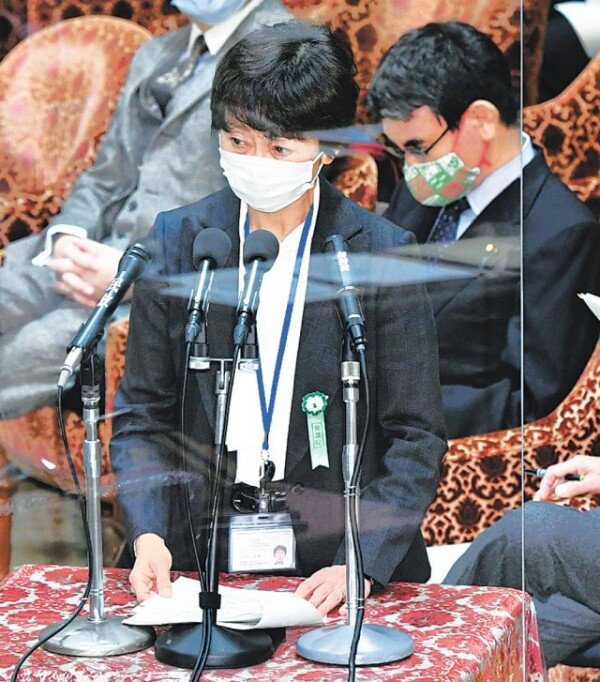In these grim times of covid-19, seeing a plummeting epidemic curve is rare. The kind of morale-boosting slump. This is the case with the number of daily deaths from the consequences of covid-19, in French nursing homes. Since the beginning of February, it has been halved. The sign of the effectiveness of the vaccination, started on December 27 in these establishments? 50% of residents are now vaccinated with two doses of Pfizer or Moderna serum. They are even nearly 70% in Finistère and Côtes-d’Armor.
At the Ministry of Health, we “watch with pleasure this drop in mortality”. But we do not yet dare to believe it completely: “The nursing homes will serve as a textbook case to judge the effectiveness of the vaccine. The analyzes carried out by Public Health France and epidemiologists establish partial correlations for the moment, however we remain extremely cautious while awaiting more in-depth analyzes ”, tempers a spokesperson.
“It was expected”
At the National Academy of Medicine, fewer reservations. This fall in the number of deaths in nursing homes is seen as “good news”. “It was even expected,” reacts Yves Buisson, president of the institution’s covid-19 cell. “These results with messenger RNA vaccines are quite remarkable. We would not have dared to dream of such a capacity to produce an immune response a few months ago, ”recalls the epidemiologist. He nevertheless regrets the delay at the start of the vaccination due to the need to obtain the informed consent of residents or their families: “We wasted time doing philosophy! “.
The number of nursing homes is also declining in Brittany. The Regional Health Agency took stock: “We went from 34 to 27 between February 5 and 23”.
However, sources of contamination continue to appear in these establishments, in Plouigneau (29), Brest, Plérin (22)… despite a vaccination campaign which is often very advanced or almost completed for the residents. “This is not abnormal since the protection of a vaccine does not happen immediately. We are also watching with attention the appearance of these clusters ”, we inform the Ministry of Health.
Why new clusters?
These outbreaks indeed raise many questions: had the residents concerned received the second dose before being infected? Is it the presence of a variant in the establishment that reduced the vaccine effectiveness? On this last point, epidemiologist Yves Buisson is doubtful: “In Brittany, it is especially the British variant which is very prevalent. However, it does not have any particular characteristic which makes it resistant to post-vaccine antibodies ”. When asked, the ARS was not able to tell us whether Brazilian or South African variants, more resistant to vaccines, had been spotted in nursing homes in the region. She specifies, however, that they only represented “3.3% of all positive tests from February 14 to 20 in Brittany”. Against 59.3% for the English variant, which has become dominant.
These positive cases after the second dose revive the hypothesis of less vaccine protection for people who have passed the 90th spring… “For the flu, we know that the vaccine works less well in elderly people, very malnourished. But it may be different with those of covid-19. We still have little data ”, underlines Christophe Trivalle, geriatrician at Paul-Brousse hospital, in Villejuif (94). Another lead: some residents who tested positive may have been before they were vaccinated. “The protocol does not allow it. It is possible that some are still passed between the cracks of the net ”, one supposes to the ARS Brittany. Many questions also persist about the ability of vaccines to reduce the transmission of the virus between people, including in nursing homes.
Fewer serious forms
The studies of pharmaceutical laboratories, however, advance the certainty that they drastically reduce the number of serious forms of covid-19. In Plouigneau, where a cluster of at least 13 residents and five agents appeared one week after the second injection, no serious cases were observed. “Four residents were a little shaken up but a priori, things are better. In a few days, I will be much more serene to tell you: yes, the vaccine has really worked, ”noted the mayor of the town, Joëlle Huon, Tuesday evening. At the Paul-Brousse Hospital in Villejuif, “we counted at least one case, which, two to three days after the second dose, was weakly positive and did not show any symptoms,” notes Christophe Trivalle. Contacted on this point, the ARS was not able, Wednesday, to give details on the state of health of Breton residents who tested positive after their vaccination.
Health care staff with little vaccination
Another obstacle remains regarding vaccination in nursing homes: the coverage of caregivers remains low: around 38% nationally (first dose) and 45% in Brittany. The risk ? That they participate in circulating the virus in these establishments. “They need to get vaccinated. This is even more important than for the flu. Nevertheless, there are reservations. Doctors are much more vaccinated than nurses, who are a little more vaccinated than nursing assistants. A constant difference in all countries, in all studies ”, notes Christophe Trivalle, also editor-in-chief of the journal“ Neurologie Psychiatrie Gériatrie ”. A reluctance also observed by Bertrand Coignec, regional president of the National Federation of Directors of Institutions and Services for the Elderly (Fnadepa): “In this sense, caregivers are representative of the general population. But the appearance of new clusters in nursing homes could encourage them to be more vaccinated ”.
Support a professional editorial staff serving Brittany and Bretons: subscribe from € 1 per month.
I subscribe
–


